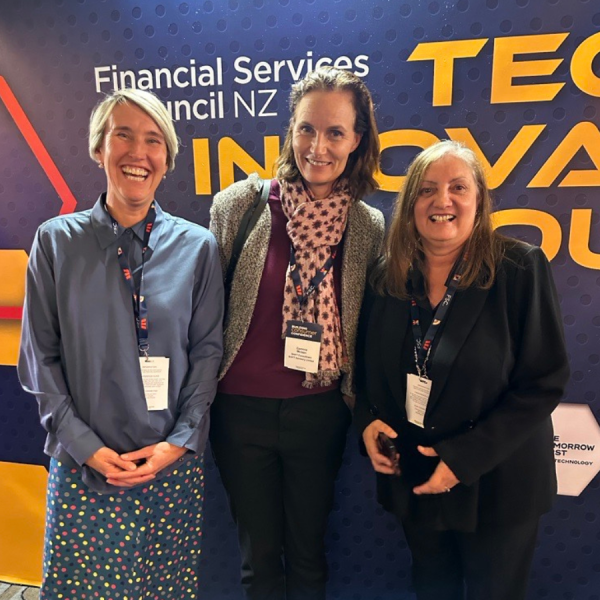Written by Corinne McLean and Janet Chenery
With such great themes and relatable panelists, it was a challenge to decide which of the many sessions to attend and not feel FOMO for those you missed.
With Consumer Confidence the Conference focus, there was an emphasis on changing customer behaviour and mindsets to empower consumers to manage their financial futures. There was a strong theme on the urgency to consider and act on how climate change will impact us.
The fireside chat with Clare Bolingford, Executive Director of Regulatory Delivery, FMA covered New Zealand’s early adoption of climate disclosures and emphasised the FMA’s initial supportive and educative approach to that regime, while noting that we are playing catch-up to our overseas counterparts with the Conduct of Financial Institutions regulation, that much of the industry have been working hard on.
Whilst New Zealand is leading the charge in climate reporting and there are challenges to do so, a number of speakers emphasised that climate reporting is only one building block in a more fulsome response to climate risk that must be considered, irrespective of whether a business is captured by climate reporting requirements.
Of particular interest for those following ISSB, Trans-Tasman and other international developments, it was explained that overseas adoption of climate and broader sustainability-related reporting standards is following rapidly and may be more detailed and prescriptive in some cases. It was encouraging to hear of ongoing work between Australia and New Zealand towards inter-operable baseline taxonomies.
With incoming voluntary sustainability reporting standards, modern slavery regulation and mandatory gender pay gap reporting, and post-implementation review of climate reporting from 2025, it is clear that these issues are mainstream, and none of these initiatives were targets of criticism by major parties.
The role of the finance industry to work with customers and investee companies to drive positive change was mentioned, alongside comment that direction from the Commerce Commission with clear sustainability-focused guidelines would be essential, especially for smaller players.
Consistent with our experience talking with clients, it was noted that MIS manager climate reporting has specific challenges. The looming 2024 reporting deadline is just the start of the transition, the opportunity to state where you are at, look into the future and see how you will cope, what opportunities might be explored and how you will transition.
NIWA’s Dr Andrew Tait put the challenge in context by presenting a scenario, that is now unfortunately one realistic outcome, unless urgent action is taken, in which New Zealand in 30 years’ time is in a “continuous state of emergency response and recovery … multiple events happening all the time continuously.”
A sobering reminder that whilst climate risk is a huge financial risk and potential opportunity, it is not just about the numbers, it’s the story of your future and requires a “global effort, that does include New Zealand”.
And coming back to building consumer confidence, climate reporting is one element of providing credible information to the primary users so that consumers can have the confidence to invest in the future that they want, and can insure against the risk and impacts of us not achieving our climate goals.

SHARE THIS ARTICLE
SHARE THIS ARTICLE